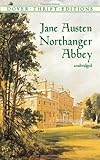Cheap Northanger Abbey (Dover Thrift Editions) For Sale
Now you find Cheap Dover Publications You can check up-to-date prices now! Reviews about Northanger Abbey (Dover Thrift Editions) for sale If Order Now Eligible for FREE Super Saver Shipping!!
|
|||||||||||
Cheap "Northanger Abbey (Dover Thrift Editions)" For Sale
"Northanger Abbey (Dover Thrift Editions) Reviews"
"Northanger Abbey (Dover Thrift Editions)" Overview
"Northanger Abbey (Dover Thrift Editions)" Specifications
Though Northanger Abbey is one of Jane Austen's earliest novels, it was not published until after her death--well after she'd established her reputation with works such as Pride and Prejudice, Emma, and Sense and Sensibility. Of all her novels, this one is the most explicitly literary in that it is primarily concerned with books and with readers. In it, Austen skewers the novelistic excesses of her day made popular in such 18th-century Gothic potboilers as Ann Radcliffe's The Mysteries of Udolpho. Decrepit castles, locked rooms, mysterious chests, cryptic notes, and tyrannical fathers all figure into Northanger Abbey, but with a decidedly satirical twist. Consider Austen's introduction of her heroine: we are told on the very first page that "no one who had ever seen Catherine Morland in her infancy, would have supposed her born to be an heroine." The author goes on to explain that Miss Morland's father is a clergyman with "a considerable independence, besides two good livings--and he was not in the least addicted to locking up his daughters." Furthermore, her mother does not die giving birth to her, and Catherine herself, far from engaging in "the more heroic enjoyments of infancy, nursing a dormouse, feeding a canary-bird, or watering a rose-bush" vastly prefers playing cricket with her brothers to any girlish pastimes.Catherine grows up to be a passably pretty girl and is invited to spend a few weeks in Bath with a family friend. While there she meets Henry Tilney and his sister Eleanor, who invite her to visit their family estate, Northanger Abbey. Once there, Austen amuses herself and us as Catherine, a great reader of Gothic romances, allows her imagination to run wild, finding dreadful portents in the most wonderfully prosaic events. But Austen is after something more than mere parody; she uses her rapier wit to mock not only the essential silliness of "horrid" novels, but to expose the even more horrid workings of polite society, for nothing Catherine imagines could possibly rival the hypocrisy she experiences at the hands of her supposed friends. In many respects Northanger Abbey is the most lighthearted of Jane Austen's novels, yet at its core is a serious, unsentimental commentary on love and marriage, 19th-century British style. --Alix Wilber





0 comments:
Post a Comment